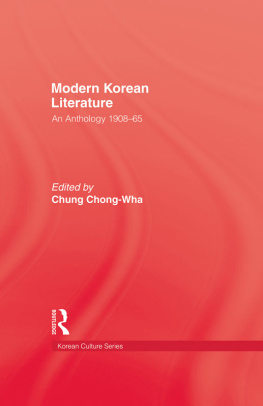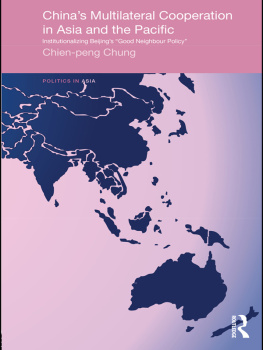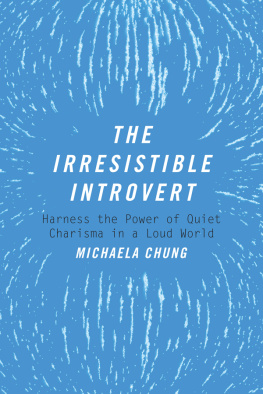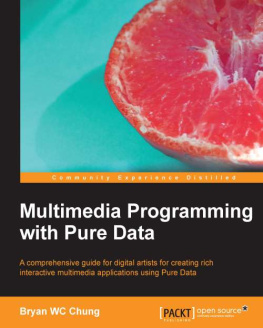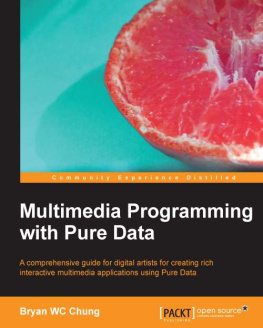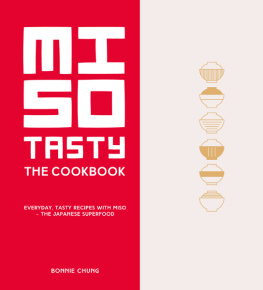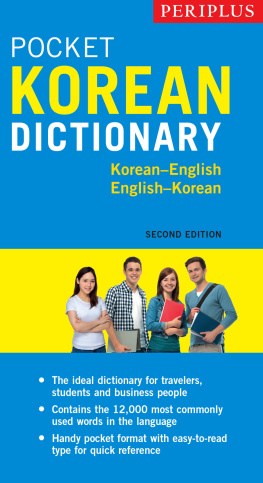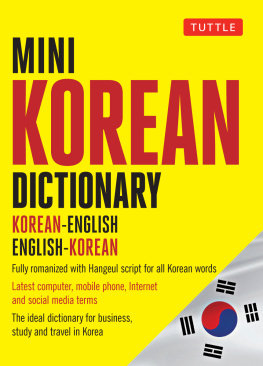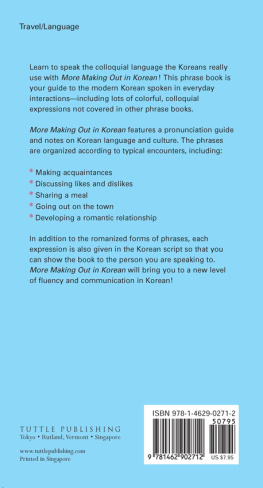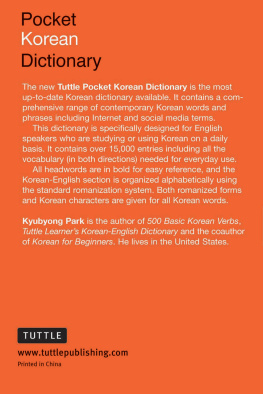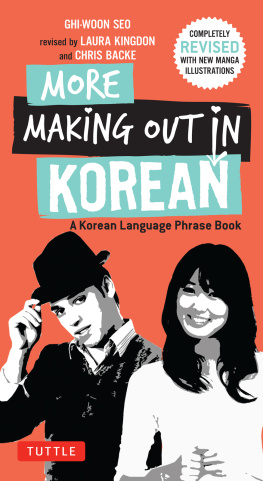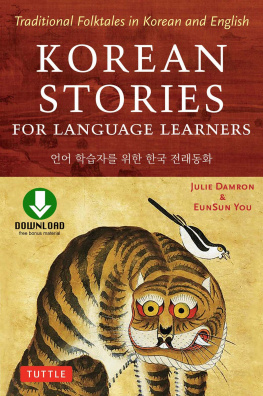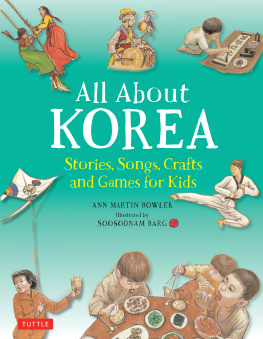MODERN KOREAN LITERATURE

KOREAN CULTURE SERIES
General Editor: Chung Chong-wha,
Professor of English and Director,
Anglo-American Studies Institute, Korea University, Seoul
KOREAN CLASSICAL LITERATURE
Edited by Chung Chong-wha
LOVE IN MID-WINTER NIGHT: KOREAN SIJO POETRY
Edited by Chung Chong-wha
MEMOIRS OF A KOREAN QUEEN: Lady Hong
Edited, introduced and translated by Choe-Wall Yang-hi
THE SHAMAN SORCERESS: Kim Dong-ni
Translated by Shin Hyun-song and Eugene Chung
THE WAVES: Kang Shin-jae
Translated by Tina L. Sallee
MODERN KOREAN LITERATURE
Edited by Chung Chong-wha
MODERN KOREAN LITERATURE
An Anthology 190865
Edited by
CHUNG CHONG-WHA

First published in 1995 by
Kegan Paul International
This edition first published in 2010 by
Routledge
2 Park Square, Milton Park, Abingdon, Oxon, 0X14 4RN
Simultaneously published in the USA and Canada
by Routledge
711 Third Avenue, New York, NY 10017
Routledge is an imprint of the Taylor & Francis Group, an informa business
Kegan Paul International 1995
All rights reserved. No part of this book may be reprinted or reproduced or utilised in any form or by any electronic, mechanical, or other means, now known or hereafter invented, including photocopying and recording, or in any information storage or retrieval system, without permission in writing from the publishers.
British Library Cataloguing in Publication Data
A catalogue record for this book is available from the British Library
ISBN 10: 0-7103-0490-0 (hbk)
ISBN 13: 978-0-7103-0490-2 (hbk)
Publishers Note
The publisher has gone to great lengths to ensure the quality of this reprint but points out that some imperfections in the original copies may be apparent. The publisher has made every effort to contact original copyright holders and would welcome correspondence from those they have been unable to trace.
CONTENTS
Chung Chong-wha
Kim Yujong (translated by Chung Chong-wha)
Hwang Sun-won (translated by Chang Wang-rok)
Kim Dong-ni (translated by Chung Chong-wha)
Han Mal-suk (translated by Kim Dong-sung)
Kang Shin-jae (translated by Shin Hyun-song)
Han Mu-suk (translated by Chung Chong-wha)
Yi Sang (translated by Chung Chong-wha)
Kim Dong-ni (translated by Chung Chong-wha)
Yi Sang (translated by Moon Hi-kyung)
Kim Sung-ok (translated by Eugene Chung)
Kim Dong-in (translated by W. E. Skillend)
Hwang Sun-won (translated by W. E. Skillend)
Hwang Sun-won (translated by Bob Donaldson)
Kim Yujong (translated by W. E. Skillend)
Yi Hyo-suk (translated by Shin Hyun-song)
Hyun Chin-kon (translated by Katherine Kisray)
Hyun Chin-kon (translated by Chung Chong-wha)
Kim Dong-ni (translated by Chung Chong-wha)
Sohn So-hi (translated by Angela Chung)
Yi Mun-gu (translated by Shin Hyun-song)
O Yong-su (translated by W. E. Skillend)
Oh Sang-won (translated by Kim Chong-wun)
Kim Dong-ni (translated by Chung Chong-wha)
Hwang Sun-won (translated by Chung Chong-wha)
Kim Sung-ok (translated by Chung Chong-wha)
Kim Sung-ok (translated by Moon Hi-kyung)
Suk Ki-won (translated by Kathryn Kisray)
Choi In-hun (translated by Lee Sang-ok)
Sunwu Hwi (translated by Chung Chong-wha)
Yi Kwang-su (translated by Lyndal Weiler)
Preface
Chung Chong-Wha
In compiling this anthology I have based the criteria for selection on historical as well as literary merits. In the ninety-odd years of Modern Korean history since the opening of the old Korea to western influences at the turn of the century, the country has produced many talented writers. As soon as a new kind of literature was launched in 1908 an amazing number of the then young writers started writing under the strong influence of western literature, producing stories and poems of remarkable quality. Within a couple of decades of the start of the new literature, there emerged writers in their late teens and early twenties, who had managed to absorb the new concepts of literature from the west through Japanese translations and then grafted the newly acquired conventions and tools upon their traditional sensibility.
These writers are represented in this anthology by Yi Kwangsu, Kim Dong-in, Hyun Chin-kon and Kim Yu-jong. Yi Kwang-sus Obscurity, Kim Dong-ins The Red Hills, Hyun Chin-kons The Fire and A Lucky Day, and Kim Yu- jongs The Camellias and Spring, Spring all mark important historical moments in the development of modern Korean literature. Their achievement shines out more remarkably in the light of the historical fact that they bravely discarded the Chines literary conventions that had had formed the basis of the cultural heritage of the country for some three to four thousand years, and also of the fact that these young writers produced, within less than two decades of the absorption of foreign literary conventions, works which are not mere imitations but powerfully original products of the imagination.
Among the group Yi Kwang-su is the first pioneer of the new literature; he is followed in the line of seniority by Kim Dong-in, Hyun Chin-kon, and Kim Yujong. It is no coincidence that the literary achievement of these writers became more refined and more original as the upstart tradition of modern Korean literature moved on. If Kim Dong-ins The Red Hills and Hyun Chin-kons The Fire and A Lucky Day are more important in a historical sense, Kim Yu-jongs The Camellias and Spring, Spring are certainly more significant in terms of literary value. If there is a clichd pattern of human movements in The Fire and The Red Hills, one sees human psychology at work in depth in The Camellias and Spring, Spring.
Along with Kim Yu-jong, many truly talented writers emerged in the 1930s. They include Yi Hyo-suk, Yi Sang, and Kim Dong-ni. By the time the generation of Yi Hyo-suk, Yi Sang and Kim Dong-ni began writing, the new literature of Korea had reached such a level of sophistication and maturity, that one can safely regard the 1930s as the period when the two decades of investment in an entirely different tradition flowered. If Yi Kwang-su, Kim Dong-in, and Hyun Chin-kon were the pioneers of the budding age of the new tradition, Kim Yu-jong, Yi Hyo-suk, Yi Sang, and Kim Dong-ni are the real founders of Modern Korean fiction. One sees the echoes of Yi Hyo-suks The Buckwheat Season in Hwang Sun-wons Snow, The Shower, Dogs in the Village beyond Hills, and more strongly and more recently in O Yong-sus Echoes.
Yi Sangs The Wings is one of the first Korean stories to explore the intricate patterns of life. The story is the very first psychological fiction of the modernist movement, which opened up a new direction in the writers concern with the depths of human heart. Already by the 1930s, slightly more than twenty years after the first initiation of the new tradition of literature, the story-telling conventions of the Korean novel had gained a great diversity in the structuring of human relationships, while the linear structure of plot took an inward movement into the dark cave of the human heart.
Next page
